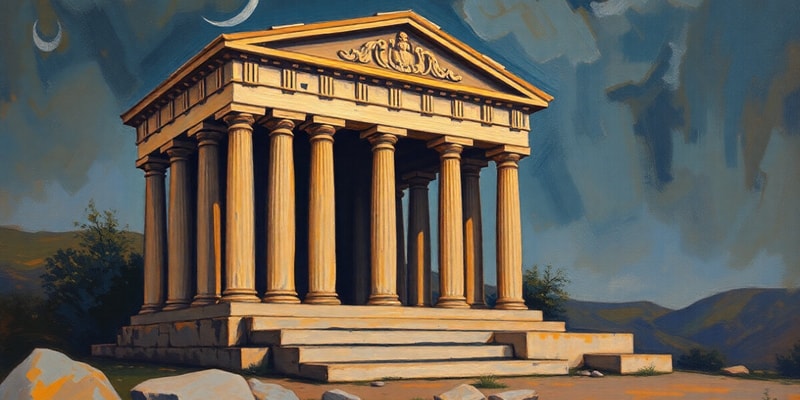Podcast
Questions and Answers
What period is characterized by the decline of the Mycenaean civilization and population migrations?
What period is characterized by the decline of the Mycenaean civilization and population migrations?
Which of the following best describes the cultural significance of the Homeric era?
Which of the following best describes the cultural significance of the Homeric era?
What was a significant impact of the Dorian migration on Greek territories?
What was a significant impact of the Dorian migration on Greek territories?
Which areas did the Dorians primarily settle after their migration?
Which areas did the Dorians primarily settle after their migration?
Signup and view all the answers
What primary sources of information are utilized to study the Homeric period?
What primary sources of information are utilized to study the Homeric period?
Signup and view all the answers
What misconception is often held about the Dorian migration?
What misconception is often held about the Dorian migration?
Signup and view all the answers
During which period did Greek tribes face significant upheaval while searching for permanent settlements?
During which period did Greek tribes face significant upheaval while searching for permanent settlements?
Signup and view all the answers
What term is sometimes used to describe the Homeric era due to limited historical knowledge?
What term is sometimes used to describe the Homeric era due to limited historical knowledge?
Signup and view all the answers
What was the primary motivation behind the Dorians' entrance into the Peloponnese?
What was the primary motivation behind the Dorians' entrance into the Peloponnese?
Signup and view all the answers
Which of the following islands did the Ionians primarily migrate to?
Which of the following islands did the Ionians primarily migrate to?
Signup and view all the answers
What characterized the economy in the Homeric era?
What characterized the economy in the Homeric era?
Signup and view all the answers
How were slaves primarily acquired in the Homeric era?
How were slaves primarily acquired in the Homeric era?
Signup and view all the answers
What was the primary unit of social organization in the Homeric era?
What was the primary unit of social organization in the Homeric era?
Signup and view all the answers
Which dialect was spoken by tribes that migrated to the northeastern Aegean?
Which dialect was spoken by tribes that migrated to the northeastern Aegean?
Signup and view all the answers
What led to the formation of the Panioniac?
What led to the formation of the Panioniac?
Signup and view all the answers
What was a significant societal change that occurred as Greek tribes settled?
What was a significant societal change that occurred as Greek tribes settled?
Signup and view all the answers
Which of the following best describes the role of a Homeric-era king during wartime?
Which of the following best describes the role of a Homeric-era king during wartime?
Signup and view all the answers
What was a significant consequence of the Dorians’ dominance over the region?
What was a significant consequence of the Dorians’ dominance over the region?
Signup and view all the answers
What marked the beginning of writing in the Greek world after a period of absence?
What marked the beginning of writing in the Greek world after a period of absence?
Signup and view all the answers
What was the primary purpose of temples established during the Homeric era?
What was the primary purpose of temples established during the Homeric era?
Signup and view all the answers
What is considered the essential foundation for a city according to the content?
What is considered the essential foundation for a city according to the content?
Signup and view all the answers
Which historical poems were created during the Homeric era based on earlier songs?
Which historical poems were created during the Homeric era based on earlier songs?
Signup and view all the answers
What did the expression 'as many as you are' signify in relation to Athenian democracy?
What did the expression 'as many as you are' signify in relation to Athenian democracy?
Signup and view all the answers
Which factor was essential for the formation of major historical artifacts like pottery in the Homeric era?
Which factor was essential for the formation of major historical artifacts like pottery in the Homeric era?
Signup and view all the answers
Who were known as the multitude in the city-state society?
Who were known as the multitude in the city-state society?
Signup and view all the answers
What was one major factor that contributed to the increase in the number of slaves in certain city-states?
What was one major factor that contributed to the increase in the number of slaves in certain city-states?
Signup and view all the answers
Which city-state led the shift toward democracy in Greece?
Which city-state led the shift toward democracy in Greece?
Signup and view all the answers
What type of regime did Sparta develop during the Archaic era?
What type of regime did Sparta develop during the Archaic era?
Signup and view all the answers
What architectural styles became dominant in the Archaic era?
What architectural styles became dominant in the Archaic era?
Signup and view all the answers
What significant changes took place in art during the Archaic period?
What significant changes took place in art during the Archaic period?
Signup and view all the answers
Which reformer is known for strengthening the democratic regime in Athens?
Which reformer is known for strengthening the democratic regime in Athens?
Signup and view all the answers
In the context of Archaic culture, what was the significance of the emergence of the Olympian twelve gods?
In the context of Archaic culture, what was the significance of the emergence of the Olympian twelve gods?
Signup and view all the answers
What characterized the Archaic era in terms of economic and political evolution?
What characterized the Archaic era in terms of economic and political evolution?
Signup and view all the answers
What was a significant outcome of the economic and social crisis at the end of the Homeric Era?
What was a significant outcome of the economic and social crisis at the end of the Homeric Era?
Signup and view all the answers
Which feature is NOT characteristic of a city-state?
Which feature is NOT characteristic of a city-state?
Signup and view all the answers
Which aspiration was central to the citizens of a city-state?
Which aspiration was central to the citizens of a city-state?
Signup and view all the answers
How did the existence of city-states affect Greek national identity?
How did the existence of city-states affect Greek national identity?
Signup and view all the answers
Which aspect defines the political system of a city-state?
Which aspect defines the political system of a city-state?
Signup and view all the answers
What was the significance of the constant struggle for liberty, autonomy, and self-sufficiency in Greek culture?
What was the significance of the constant struggle for liberty, autonomy, and self-sufficiency in Greek culture?
Signup and view all the answers
Which early civilization is noted for having organized into cities prior to the rise of Greek city-states?
Which early civilization is noted for having organized into cities prior to the rise of Greek city-states?
Signup and view all the answers
What role did the Greek city-state play in the development of Greek civilization?
What role did the Greek city-state play in the development of Greek civilization?
Signup and view all the answers
How did the Sumerians differ from the Greeks in terms of political engagement?
How did the Sumerians differ from the Greeks in terms of political engagement?
Signup and view all the answers
What factors contributed to the economic crisis of the Homeric communities at the end of the 9th century BC?
What factors contributed to the economic crisis of the Homeric communities at the end of the 9th century BC?
Signup and view all the answers
What was the impact of Greek migrations during the Homeric era?
What was the impact of Greek migrations during the Homeric era?
Signup and view all the answers
What was a characteristic of the nobles in Homeric society?
What was a characteristic of the nobles in Homeric society?
Signup and view all the answers
Which of the following was NOT a pathway for the formation of city-states?
Which of the following was NOT a pathway for the formation of city-states?
Signup and view all the answers
Which aspect was crucial for the development of the concept of 'citizen' in Greek city-states?
Which aspect was crucial for the development of the concept of 'citizen' in Greek city-states?
Signup and view all the answers
What were the primary social and political conditions that influenced the transition from Homeric communities to city-states?
What were the primary social and political conditions that influenced the transition from Homeric communities to city-states?
Signup and view all the answers
Study Notes
Ancient Greece (1100 to 23 BC)
- Greek history began after the Mycenaean civilization collapsed around 1100 BC.
- The 11th-9th centuries BC were a transitional period with migrations and settlement.
- Geography influenced Greek economic development and political organization. The terrain was difficult for unification, but the sea facilitated expansion.
- City-states and contact with other cultures were important in creating Greek culture.
Homeric Era (1100-750 BC)
- Mycenaean centers declined, causing upheaval and migrations.
- This period is also known as the Greek Middle Ages or Dark Ages.
- Continuous movements of Greek tribes created conditions for settlement and reconstruction.
- Homeric epics are the main source of information for this era.
Archaic Era (750-480 BC)
- Economic, social, and political evolution began.
- Land was the main source of development and production occurred in households.
- Limited specialization due to limited resources.
- Trade, war, and piracy were other sources of obtaining products.
- The household was the primary social unit.
- Aristocrats controlled land, but other non-aristocratic people also lived in the households.
- Slavery was developing.
The First Greek Colonization
- Greek tribes expanded in the Aegean from around the mid-11th to 9th centuries BC.
- Island hopping was used as a way to colonize.
- These migrations settled in Asia Minor.
Political Organization
- Tribes were the initial basis of organization
- The need for addressing problems caused political organization.
- The king's authority in Homeric societies was religious and judicial.
The Distinction Between Nobles and the Multitude
- The concept of majority decisions started in the Homeric era.
- This was a precursor to Athenian democracy.
The City-State
- The city-state, also called polis, emerged in this era.
- The polis was a combination of a geographical area and a political group.
- Citizens had aspirations for freedom, autonomy, and self-sufficiency.
The Crisis of the Homeric World
- Population increase and limited land led to economic crisis.
- The crisis affected the authority of the kings and gave rise to the importance of the nobles.
The Development of Slavery
- The economic and social organization was tied to slavery.
The Establishment of Tyrannical Regimes
- Wealth and power contributed to the increase of tyrants and the development of naval power.
Studying That Suits You
Use AI to generate personalized quizzes and flashcards to suit your learning preferences.
Related Documents
Description
Explore the key periods of Ancient Greek history from the collapse of the Mycenaean civilization to the Archaic Era. This quiz covers the geographic influences, cultural developments, and significant events that shaped Ancient Greece. Test your knowledge about the transitions, migrations, and trade that defined this fascinating era.




